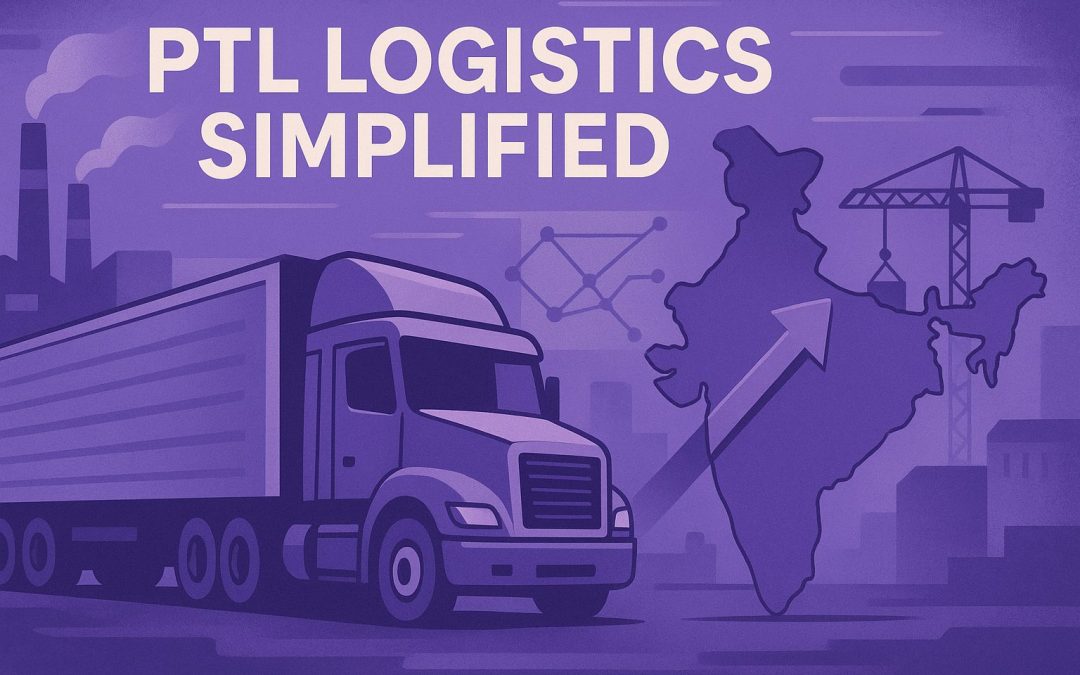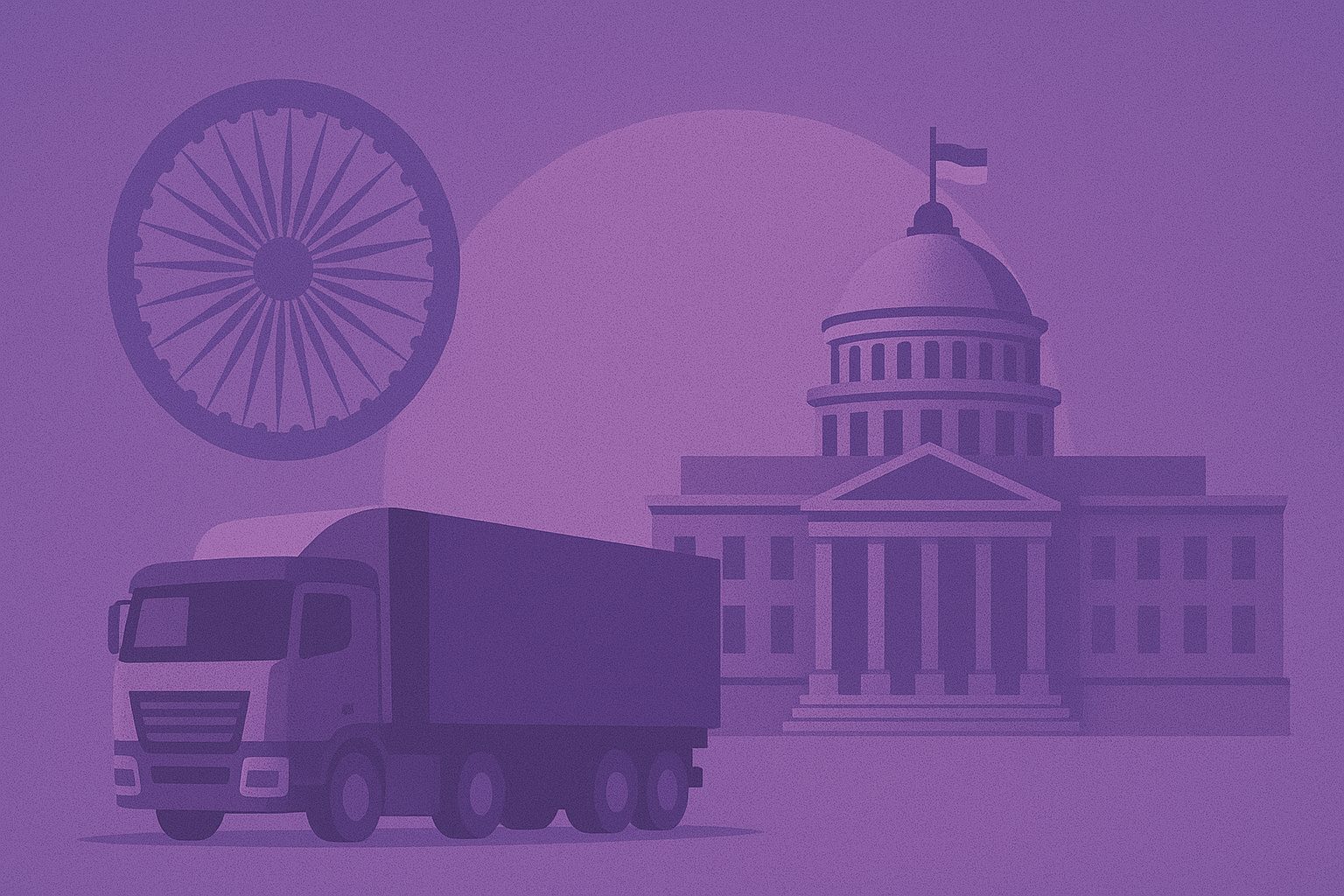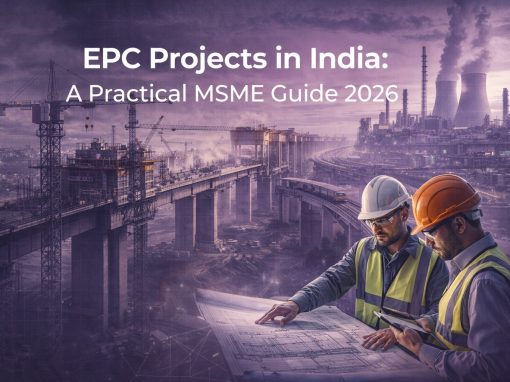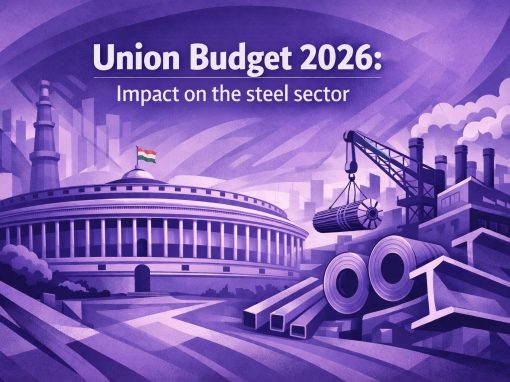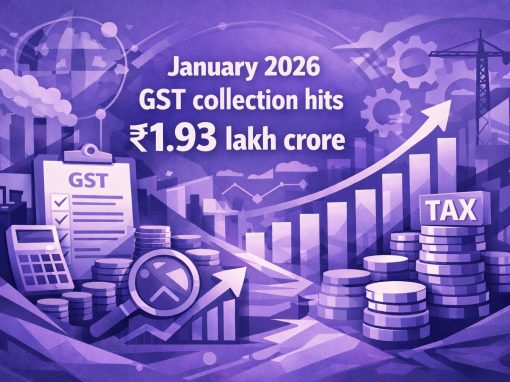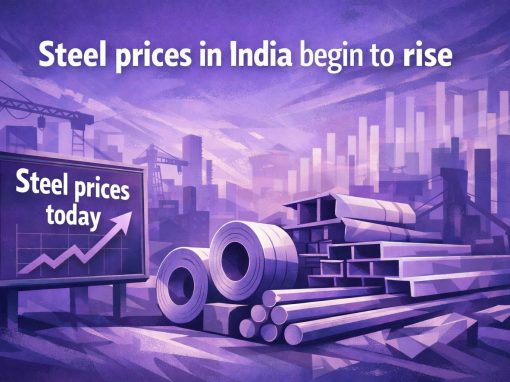Table of Contents
Micro, Small, and Medium Enterprises (MSMEs) form the backbone of India’s economy. They make up almost 30% of the GDP and employ millions of people. These businesses need good and cheap logistics more than ever as they expand their customer base across the country. As these businesses grow, efficient and affordable logistics becomes even more critical.
However, traditional logistics models often don’t suit MSMEs, especially those that ship in smaller quantities. This is where Part Truck Load (PTL) logistics offers a smart solution. By allowing multiple businesses to share truck space, PTL provides a cost-effective, flexible, and scalable alternative that is perfectly suited for the shipping needs of growing MSMEs.
What is PTL Logistics?
Part Truck Load (PTL) logistics is a transportation method where goods from multiple shippers are consolidated and transported in a single truck. Instead of booking the entire vehicle, each shipper pays only for the portion of space or weight their shipment occupies. This shared model saves a lot of money on shipping, especially for companies that don’t ship in bulk.
PTL vs. Other Shipping Options
To understand PTL better, it’s useful to compare it with two other common logistics options: Full Truck Load (FTL) and courier/parcel services.
| Feature | PTL (Part Truck Load) | FTL (Full Truck Load) | Courier/Parcel |
| Shipment size | Medium (20-2,000 kgs or a few pallets) | Large (entire truck capacity) | Small (packages/parcels) |
| Cost | Shared cost (economical for mid-sized loads) | High (you pay for entire truck) | High per unit (for bulky items) |
| Speed | Moderate (slightly longer due to consolidation) | Fast (direct delivery) | Fast (for small parcels) |
| Flexibility | High for orders that need to be shipped when ready | Less flexible | High for very small items |
| Best for | MSMEs with regular shipments | Bulk manufacturers, exporters | E-commerce, documents, samples. |
When and Why PTL is Used
PTL logistics is ideal when your business:
- Ships goods that are too large for a courier, but not large enough to justify booking an entire truck.
- Sends regular shipments to multiple locations or across cities.
- Needs a cost-effective solution without compromising too much on delivery time.
- Handles products like packaged goods, electronics, furniture, textiles, or industrial supplies that don’t need urgent or dedicated transport.
Most PTL service providers allow you to send goods as small as 20–30 kg, and up to 2,000–3,000 kg depending on the service. Shipments are typically palletised or packed in boxes for easy handling and consolidation.
How Does PTL in Logistics Work?
Imagine a convoy of cargo trucks, each one carrying goods destined for different locations across the country. This is the essence of PTL freight logistics.
So, whether you’re a small business owner with a one-time shipping need or a large corporation with regular cargo to move, PTL freight may be the perfect fit for your shipping puzzle.
Here is a general outline of how PTL in logistics work:
- A business contacts a third-party logistics provider (3PL) to request a PTL shipment
- The 3PL works with the business to determine the pickup and delivery locations and the size and weight of the goods to be shipped
- The 3PL coordinates the pickup of the goods and arranges for them to be loaded onto a truck with other companies’ goods
- The truck is then dispatched to the delivery location, making any necessary stops along the way to drop off or pick up other companies’ goods
- Once the truck arrives at the delivery location, the goods are unloaded and delivered to the recipient
Overall, PTL logistics involves coordinating the movement of goods on a single truck with other companies’ goods, to maximise the use of the truck’s capacity and minimise shipping costs.
Why PTL Logistics Matters for MSMEs
For MSMEs in India, managing logistics efficiently can be a challenging, especially when order volumes fluctuate. PTL helps bridge the gap between small-scale parcel delivery and large-scale freight transport. It allows small businesses to scale operations, reach wider markets, and save significantly on logistics costs, all while maintaining delivery reliability.
Common Logistics Challenges for MSMEs
- Limited Shipment Sizes
Most MSMEs don’t produce or ship goods in bulk. Their orders may be small or irregular, making it difficult to justify the cost of booking a Full Truck Load (FTL). - High Logistics Costs
Hiring full trucks or relying on parcel/courier services for medium-sized shipments can be expensive. High logistics costs directly eat into margins, something most MSMEs can’t afford. - Poor Access to Tier-2 and Tier-3 Cities
While urban areas have well-developed logistics networks, many MSMEs operate from or ship to tier-2 and tier-3 cities, where reliable, affordable delivery options are often limited or inconsistent.
How PTL Logistics Solves These Challenges
Part Truck Load (PTL) logistics directly addresses the above pain points by offering a flexible, scalable solution tailored to the needs of smaller businesses.
- Cost Efficiency
MSMEs pay only for the space or weight their goods occupy, rather than the full truck, which helps lower shipping costs. - Support for Smaller Loads
PTL enables MSMEs to ship small and mid-sized consignments without delay, helping them fulfill orders on time and keep inventory lean. - Wider Reach with Lower Risk
PTL providers typically offer pan-India coverage, including tier-2 and tier-3 cities. This allows MSMEs to expand their customer base without needing local warehousing or multiple logistics partners. - Flexibility in Operations
With PTL, MSMEs don’t have to wait to accumulate large orders. They can ship on demand, supporting quicker order fulfillment and better customer satisfaction.
For India’s MSMEs, PTL logistics is not just a transportation method, but a growth enabler. By overcoming cost and scale barriers, PTL allows small businesses to compete more effectively, reach new markets, and operate more efficiently in an increasingly connected economy.
Key Players Offering PTL Services in India
| Company | PTL Service Highlights | MSME-focused Benefits |
| Tata nexarc
(Aggregator) |
Technology-driven PTL with flexible part-load shipments, multimodal transport options, digital booking and tracking platform. | End-to-end visibility and timely deliveries, low cost, easy expansion across India. |
| Rivigo | Relay trucking model, fast PTL delivery with real-time tracking. | Faster transit for mid-sized shipments and better reliability. |
| Gati | Scheduled PTL movement, part of Allcargo Group, door-to-door delivery. | Cost-effective for recurring shipments and good support in smaller towns. |
| Blue Dart | Express PTL for heavier shipments with a strong last-mile network. | Trusted brand, consistent delivery to remote areas. |
| XpressBees | Expanding B2B PTL network, originally E-commerce focused. | Scalable for growing MSMEs, competitive pricing. |
| Shiprocket (Aggregator) | Online PTL booking; multiple carrier integration; e-commerce platform tie-ins | Easy access for small businesses; transparent pricing |
| Delhivery | Extensive PTL network covering 18,000+ pin codes; integrated tech platform. | Wide reach across urban/rural India with flexible shipment scheduling. |
| Porter (Aggregator) | App-based logistics, PTL and on-demand freight across cities. | Flexible, on-demand PTL, ideal for small urban businesses. |
Top 5 PTL Challenges MSMEs Face, with Solutions
- Challenge: Longer Transit Times Compared to FTL
Solution: Choose PTL providers that offer defined delivery SLAs (Service Level Agreements) and route optimisation. Plan shipments in advance to avoid last-minute delays. - Challenge: Risk of Damage Due to Cargo Mixing
Solution: Use strong packaging, proper labelling, and select logistics partners who follow strict cargo handling protocols and offer insurance coverage. - Challenge: Lack of Real-time Tracking in Some Regions
Solution: Work with tech-enabled logistics providers that offer GPS tracking, mobile updates, and shipment visibility dashboards for better monitoring. - Challenge: Operational Complexity in Remote or Rural Areas
Solution: Partner with providers that have a strong last-mile delivery network and offer multi-modal logistics (road + rail/air) to improve accessibility. - Challenge: Limited Control Over Delivery Schedule
Solution: Use digital freight platforms or aggregators that allow for flexible scheduling, load consolidation preferences, and better coordination with delivery timelines.
Government Initiatives and Support for PTL in India
The Indian government has taken several forward‑looking policy steps and built digital infrastructure to strengthen logistics, especially benefiting MSMEs and enabling systems like PTL to scale more efficiently.
National Logistics Policy & Digital Infrastructure (ULIP, e‑LOGS, etc.)
- In September 2022, the National Logistics Policy (NLP) was launched to build a “technologically enabled, integrated, cost-efficient, resilient and sustainable logistics ecosystem.”
- A key component is the Unified Logistics Interface Platform (ULIP), which connects multiple government systems (ports, rail, road, customs, etc.) via APIs. As of 2025, ULIP integrates over 40 systems from various ministries and processes more than 100 crore API transactions.
- ULIP enables real‑time visibility of cargo movements, vehicle & driver verification (via integration with Vahan, Sarathi), route optimisation, and more efficient documentation.
- The Ease of Logistics Services (e‑LOGS or e-Logs) portal is another NLP initiative. It enables logistics industry associations to raise issues directly with relevant government departments (through a “Service Improvement Group”) to fast-track resolution of operational bottlenecks.
- Through these digital platforms, the government aims to reduce paperwork, fragmentation, delays at checkpoints, and inefficiencies, thereby lowering costs and time delays for PTL and other logistics modes.
MSME Support Schemes & Incentives
While not always directly targeted at PTL logistics, several MSME policies support efficient logistics indirectly:
- The MSME Champions Portal is a grievance resolution and information hub that helps small units across functions (including supply chain and logistics concerns) by resolving issues through AI/ML, coordination, and central oversight.
- The MSME Trade Enablement and Marketing Initiative (MSME‑TEAM) helps MSMEs integrate with E-commerce and logistics by offering support like onboarding, cataloging, and packaging. This enables better logistics integration for small sellers.
- Infrastructure and transport initiatives (e.g. via the Union Budget) also support logistics indirectly: improved rural connectivity (roads), development of logistics infrastructure, and push for Digital Public Infrastructure (DPI) in logistics to reduce friction in movement.
Push for Formalisation & Supply Chain Integration
- The NLP and related reforms explicitly emphasise standardisation, digitisation, regulatory simplification and formalisation of logistics services, benefiting MSMEs in the long run.
- Development of Multi‑Modal Logistics Parks (MMLPs) (hub‑and-spoke) is a key infrastructure initiative, enabling better consolidation, intermodal transfers, and cost savings in freight movement.
- The logistics architecture under NLP gives special attention to MSMEs as a core sector whose supply chains and freight movement need support.
- The government is also working on State Logistics Policies aligned with the central logistics policy, encouraging states to coordinate infrastructure, land use, and regulatory support for smoother logistics.
The Future of PTL Logistics in the MSME Sector
The future of Part Truck Load (PTL) logistics in India is closely tied to the evolving needs of MSMEs and the rapid transformation of the country’s logistics ecosystem. As MSMEs increasingly adopt digital tools and expand into pan-India and global markets, PTL logistics is poised to play an even more central role in supporting their growth.
Technology & Data-Driven Logistics
Advancements in technology and data analytics are revolutionising PTL operations. From AI-powered route optimisation to real-time shipment tracking, logistics providers are using intelligent systems to minimise delays, reduce empty truck miles, and improve delivery accuracy. These innovations help MSMEs plan inventory better, reduce transit uncertainty, and increase customer satisfaction. Predictive analytics also help PTL companies optimise load consolidation and suggest ideal shipping schedules for cost savings.
E-Commerce Driving PTL Demand
The explosive growth of E-commerce, especially from tier-2 and tier-3 cities, has dramatically increased the need for efficient mid-sized freight movement. MSMEs selling on platforms such as Amazon, Flipkart, Meesho, and ONDC require reliable logistics solutions that can handle frequent, small-to-medium sized shipments across vast geographies. PTL fits this demand perfectly, offering the flexibility and cost-efficiency needed to support omnichannel distribution.
Warehousing + PTL = More Efficient Supply Chains
The integration of warehousing services with PTL logistics is emerging as a key trend for MSMEs aiming to run lean, agile supply chains. By combining on-demand warehousing with shared freight services, businesses can store goods closer to customer hubs and dispatch them in smaller lots. This reduces overheads, improves delivery speed, and supports just-in-time inventory models which are especially important for MSMEs with limited storage space or working capital.
Green Logistics and Sustainability
As environmental awareness grows, the PTL model is gaining favor for its inherently sustainable structure. By consolidating multiple shipments into fewer vehicles, PTL helps reduce carbon emissions and fuel consumption per shipment. Leading PTL providers are also beginning to adopt electric vehicles, route optimisation for fuel efficiency, and eco-friendly packaging practices. These trends align with broader sustainability goals and will soon become a value differentiator for MSMEs conscious of their environmental impact.
Case Studies: MSMEs Leveraging PTL Logistics for Expansion
E-Commerce: Meena’s Handicrafts – Scaling with PTL
Meena’s Handicrafts, a small-scale artisan business based in Rajasthan, sells traditional handcrafted goods online through platforms like Etsy and Amazon India. Initially, Meena struggled with high shipping costs and unreliable parcel services that limited her ability to expand beyond metropolitan cities. By adopting PTL logistics, Meena was able to ship mid-sized consignments cost-effectively to tier-2 and tier-3 cities across India.
Using a PTL provider with real-time tracking and flexible loading options, Meena consolidated orders weekly rather than shipping individually. This helped her reduce logistics costs by 30%, ensure timely deliveries, and expand her customer base into emerging markets. PTL also allowed her to better manage inventory and reduce packaging waste by shipping bulk orders directly to regional warehouses.
Construction: Shakti Builders – Optimising Material Transport
Shakti Builders, a growing MSME construction company in Gujarat, regularly needs to transport cement, steel rods, and other materials to multiple project sites in nearby towns. Previously, the company relied on full truckloads or fragmented parcel shipments, both expensive and inefficient given their varying material volumes.
By switching to PTL logistics, Shakti Builders now ships partial loads tailored to each site’s requirements, reducing transportation costs by nearly 25%. PTL providers’ consolidated freight movement and scheduled deliveries improved supply chain reliability, minimising project delays. The integration of PTL with warehousing near key construction hubs helped Shakti Builders maintain a lean inventory and respond quickly to on-site demands.
Conclusion
PTL logistics is transforming how MSMEs in India manage their shipments by offering cost-effective, flexible, and scalable solutions. It helps small businesses expand reach and improve supply chain efficiency without the burden of full truckload costs. MSMEs should actively explore PTL services to drive affordable growth. Increased awareness, technology adoption, and stronger public-private partnerships will further boost PTL’s impact. Together, these steps can build a more efficient and resilient logistics ecosystem for India’s MSMEs.
Need reliable logistics solutions for your business?
Tata nexarc helps businesses streamline their supply chain with trusted transporters, competitive pricing, and real-time tracking—ensuring timely and cost-effective delivery across India.
FAQs
What is PTL logistics?
How is PTL different from FTL and courier services?
Why is PTL important for MSMEs?
What shipment sizes are ideal for PTL?
Which companies offer PTL services in India?
What are common challenges for MSMEs in PTL logistics?
How can MSMEs reduce PTL challenges?
How does the government support PTL logistics in India?
How is technology shaping the future of PTL?
Can PTL logistics help specific MSME sectors?
A product manager with a writer's heart, Anirban leverages his 6 years of experience to empower MSMEs in the business and technology sectors. His time at Tata nexarc honed his skills in crafting informative content tailored to MSME needs. Whether wielding words for business or developing innovative products for both Tata Nexarc and MSMEs, his passion for clear communication and a deep understanding of their challenges shine through.
